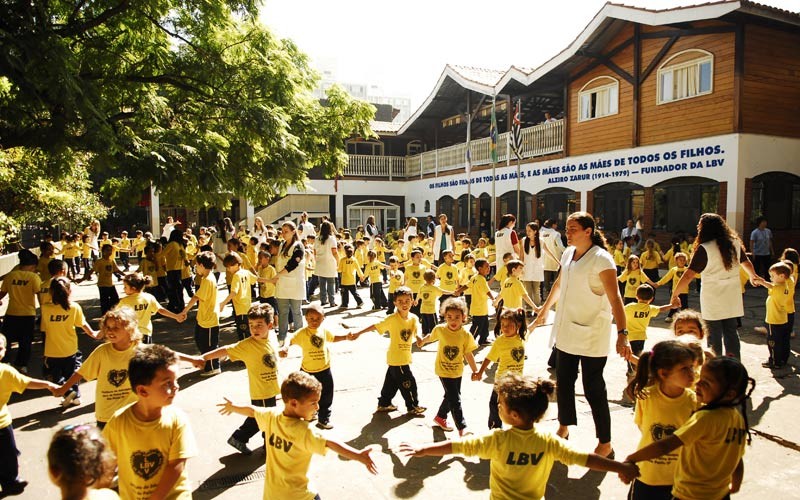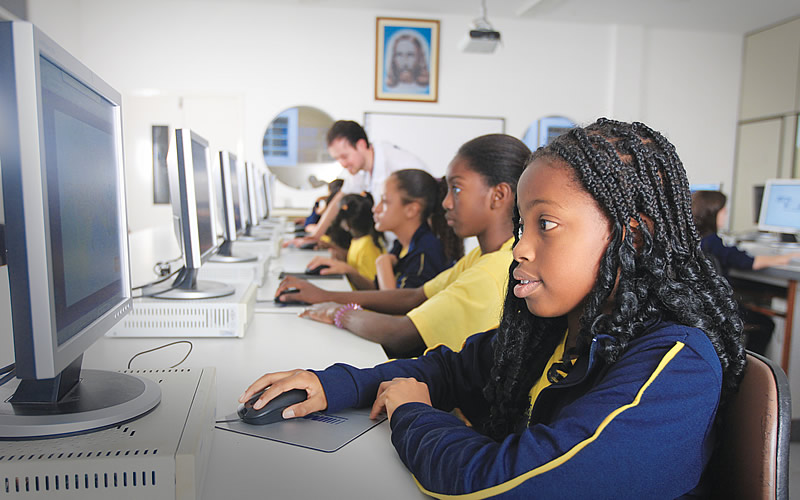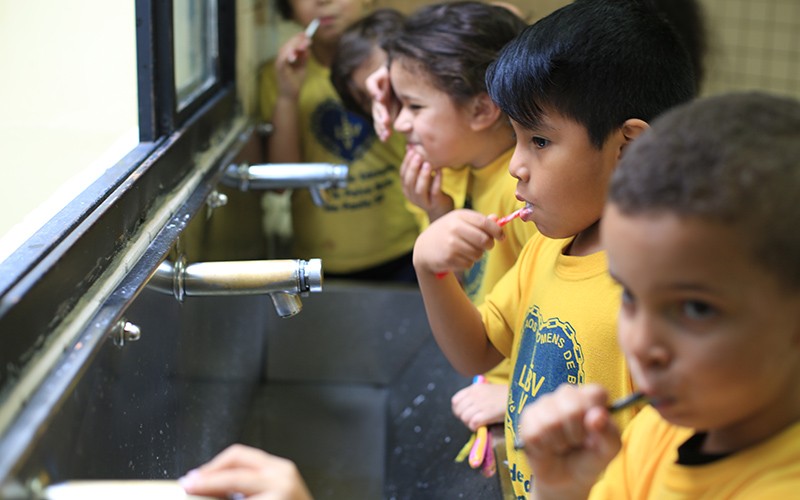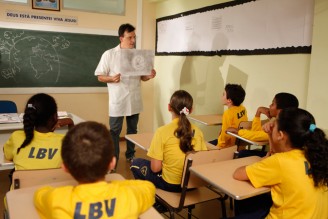
Social inclusion for quality education
Suelí Periotto
Tuesday | March 29, 2016 | 6:19 PM | Last update: September 22, 2016, 4:07 PM (Brasilia time)
The Legion of Good Will has always been concerned with promoting an Education that is capable of supplying Brain and Heart, as the creator of the LBV’s pedagogical proposal, educator Paiva Netto, defines. With the Pedagogy of Affection (for children up to the age of 10) and the Ecumenical Citizen Pedagogy (from the age of 11 and up), he shows us that the possibilities for students to develop themselves also appear from the inside out. In other words, each person has an inner potential besides cultural background, which upgrades his/her skills and abilities.

Na Supercreche Jesus, os alunos contam com uma extensa área verde com belos jardins. Por meio das ações educacionais, desde pequenos eles aprendem o valor das árvores para o Meio Ambiente.
In the LBV’s pedagogy, the educator’s mediatory activity when interacting with the students is a fundamental factor for both of them to learn and widen their intellect; as co-authors, they share knowledge among each other, acting in a very distinct manner within an integrated process.
In this educational practice, Paiva Netto points the way to Ecumenical Spirituality, which takes on a role to shed more light on cultural, social and intellectual aspects of knowledge. To ensure the solidary knowledge—the combination of the cognitive potential and ethical, ecumenical and spiritual values—the LBV’s pedagogy sees the individual in its entirety, as a biopsychosocial Spirit-Being
What does It mean to be a biopsychosocial spirit-being?
In the LBV’s educational units, students are considered as a biopsychosocial Spirit-Being, since they already carry within them a background that will contribute to the learning process.
“Spirit”
The Good Will Pedagogy values what is found within, the subjective aspects that carry a record of previous experiences; after all, the student is not a tabula rasa*2
It also stimulates one’s feelings and reinforces values such as Ecumenical Solidarity, Friendship and Companionship, employed in an empathic manner.
“Psycho”

Emotional issues are observed by the multidisciplinary team of the LBV’s units, especially by psychologists. When necessary, the student is supported in the aspects concerning fragility derived from disaggregating situations, common among social vulnerability environments in which many families are subject to. Learning difficulties and behavior disorders that require professional help from a psychologist, such as cases concerning aggressiveness and social isolation and apathy, are carefully observed.
“Social”
The LBV emphasizes the combined work of the school and family. The organized participation of parents in the school life of their children is fundamental. When the school knows the social and economic reality of the family it becomes possible to contribute towards the strengthening of the affective ties. The family needs consideration, encouragement and guidance in order to overcome difficulties and identify and strengthen its skills. Through the practice of values enlightened by Ecumenical Spirituality, the Culture of Peace is promoted in the schools of the LBV, where, in fact, the school dropout rate is zero.
“Bio” (biological)

Depois de comer, antes de voltarem para as salas de aula, os pequenos fazem a higiene bucal. Vale lembrar que, nas unidades de atendimento da LBV, o incentivo a essa prática começa desde cedo.
Encompasses medical, dental and nutritional care. Physical health is thought of in a preventive manner, including taking information and guidance to the families through talks, pamphlets as well as health programs that can benefit them. The wellbeing of the body is an essential condition for an adequate educational process.
Its own methodology
Considering the Being in his essence, the Legion of Good Will developed its own methodology for its educational proposal known as the Learning Method through Rational-Emotional-Intuitive Research (MAPREI), with main focus on research and intuition. The method has six stages in which the pupil is the protagonist in the educational scenario, and the educator is the fundamental element in the process of building knowledge. At the same time, this method motivates the pupil to continue his/her studies until he/she enters academic life. The student has a voice; he/ she is a researcher that employs intuition and can express his/her ideas orally or in writing without fear or shyness, behaviors generally associated with low self-esteem.
The LBV’s method invests in quality education to promote social inclusion, since it offers the means for the student to better prepare him/herself for the job market. Based on figures that show the significant growth in the number of university graduates, one can have the impression that higher education represents perhaps the only passport into full social inclusion. Indeed, the university degree does mean new and promising paths in a professional career; however, some issues do come up. Does higher education in itself ensure social inclusion? Do the contents acquired throughout higher education determine good professional performance? Does an individual with a diploma, and this alone, become capable of expressing and applying the knowledge gained?
In order to better evaluate these pertinent questions, let us ponder on the following words offered by the leader of the LBV in his book É urgente reeducar!*3 [It is urgent to re-educate!]:
“(…) An effective preparation: The Spirit has a predominant place in our everyday actions. However, in thepreparation of youths and adults alike, for their subsistence in this material world of technologies never seen before—and, paradoxically, at the present time, so unstable for those who work hard for their own future—, we must take into the highest account that students must be qualified with efficiency for the strict demands of the competitive job market. Moreover: prepare them in a manner that they do not follow a path in which professions for which they prepared themselves for no longer exist at the moment they get their diploma. Therefore, it is essential that they receive an effective education in order to be bold and enterprising, so that they can overcome the supervenient facts that, at any time, challenge society and frighten crowds. (...) For argumentative purposes, bold plans will be of no avail if there is no one who has been properly prepared to develop them”.
The Legion of Good Will’s teachers are concerned with the challenging realities of the 21st century and therefore work on cognitive aspects combined with Ecumenical Spirituality. In this manner, a pedagogical content of excellence is established, which is primordial for the most recent professions, preparing students for the ever-growing challenges. Aware of the ethical, ecumenical and spiritual values that are part of the conceptual foundations of the pedagogy they apply in the classroom, the educators strengthen students’ skills and abilities.
Thus, it fills us with joy to see the work of such dedicated professionals who regard themselves as co-authors of the building of a Solidary, Altruistic and Ecumenical Society, which is one of the Legion of Good Will’s reasons for being. This millennium is certainly grateful for it.


